My own personal Hell: Thoughts on Hazbin Hotel

(EDIT 9/25/2024: This piece is now mirrored on my new personal blog! I’m no longer using Medium, and can’t guarantee that this site won’t mess with my formatting or randomly lose chunks of the article, as it’s done in the past.)
I never expected to watch Hazbin Hotel, the raunchy musical dramedy about demons created by Vivienne “VivziePop” Medrano. (No, not that one. The one with the wolf girl is Helluva Boss. This is the other one.) I just don’t vibe with the characters, the aesthetics, the sense of humor, any of it. I knew it wouldn’t be for me, and planned on staying far away from both the show and the drama constantly swirling around it like a hurricane. I know many of the people reading this feel the same way.
But then, the unthinkable happened: my boyfriend made me watch it with him. Anthony argued that we should at least give it a shot. It’s the big “indie animation” success story — the mega-popular pilot from YouTube that got picked up for a full series by beloved arthouse film distributor A24 and Amazon. Maybe it’d turn out better than we expected, or we’d be able to figure out what others see in it. And if we ended up hating it, we’d at least be able to give concrete reasons why, rather than just judging a book by its cover.
Having now watched the entire eight-episode first season (plus the pilot), I can safely say that, no, I didn’t like the show. But I’m a little bewildered by the specific ways in which it’s a mess.
The general vibe was about as grating as I expected, though the star-studded Broadway voice cast, expressive animation, and catchy songs do their damnedest to try and make it endearing. Very real effort was put into the presentation. More than anything, though, I was just blown away by the sloppy writing. And no, I don’t just mean the constant forced swearing and dick jokes. I’m talking big picture stuff. It really, truly feels like a first draft written with no oversight. Writing that’s always telling instead of showing. Constant diversions to introduce insufferable new characters and subplots, even though the main cast is so woefully underdeveloped. Big emotional crescendos that never feel earned. A central conflict that makes no goddamn sense if you stop and think about it even briefly.
I could go on and on. And I will!!
I didn’t think I was going to write this review, but there’s a dearth of genuine, thoughtful criticism of Hazbin Hotel. It’s feels like it’s either “Wow, those DeviantArt kids really went and made a whole cartoon! Bless their hearts,” or people combing through frame by frame looking for ammo for fandom bickering. I’m not here for any of that. I’m not here to write a callout post, or to get into behind-the-scenes drama. I just want to judge the final product on its own merits as a television show, offering praise where I feel it’s due while also explaining why it was one of the most frustrating things I’ve watched in a long time.
(This article will contain full spoilers for Hazbin Hotel, and will discuss heavy topics that come up in the show such as sexual abuse, abusive relationships, addiction, self-harm, queerphobia, genocide, racism, slavery, cannibalism, and honestly probably some other stuff I’m forgetting. It’s a long list. It’s a show about hell.)
(Edit September 2024: Adding a note here for context months later just to say that I did, in fact, end up catching up on sister series Helluva Boss later, and… I kinda enjoyed it? It shares some of Hazbin’s flaws, but it’s got better writing and pacing and characters and designs and is overall just way more solid as a TV show. It’s fine. Don’t expect a full review of that anytime soon, but believe me, I did give both of these shows a fair shot!)

The pilot and the premise
I didn’t actually watch the pilot at first. I figured I didn’t need to. It’s over four years old at this point, featuring an entirely different voice cast from the full series, and it isn’t even on Prime Video. If it was required viewing, it’d be on Amazon with the rest of the show, right? I mean, how many shows can you even think of that have required you to go seek out a separate pilot episode before watching the first season?
Well, turns out I was wrong. The pilot is very much still canon, and while the first Amazon episode makes some efforts to get new viewers up to speed, it’s pretty clear that the show expects you to have already seen the pilot, which sets up the character relationships and the founding of the titular hotel. This should be the first sign of one of my big problems with the show: it feels like it was written almost exclusively for people who are already obsessive fans of the characters and world, with very little effort to craft a coherent story that will draw in nonbelievers.
But I digress.
The pilot gives us our main characters and the basic premise. The series is set in a cartoonish version of Hell very loosely based on Christian mythology, which is less a place of eternal punishment and more a city of nonstop sin. Once a year, Hell is attacked by angels in order to curb “overpopulation” among the sinful human souls, with Exorcists randomly slaughtering them in the streets. This is obviously a bad thing. (Of course, citizens of Hell are already slaughtering each other all the time, but I think they, like… respawn, or something? And only angel weapons make them stay dead? I don’t know, the show doesn’t really explain this all that clearly.)
In steps Charlotte “Charlie” Morningstar, the plucky Princess of Hell and daughter of the realm’s absent ruler, Lucifer. Charlie has come up with an idea for how to deal with this annual genocide: redemption! Hell won’t be so full of sinners if Charlie can implement a system to teach some of them the error of their ways and send them off to Heaven. And she decides the perfect place to do this would be a hotel, the “Happy Hotel,” because a hotel is a place where you only stay temporarily before moving on. And so the pilot revolves around Charlie attempting to garner support for this hotel plan against the backdrop of the typical chaos of Hell. Eventually she does manage to find a benefactor, but only by making a deal with one of the most dangerous demons in Hell: Alastor the Radio Demon. He doesn’t actually believe in redemption, but he thinks the hotel thing sounds funny, deciding to rename it the “Hazbin Hotel.” And so the stage is set.
Now, if you’re like me and Anthony, this premise probably raises a million questions. We’ll get to those. Let’s just roll with it for now.
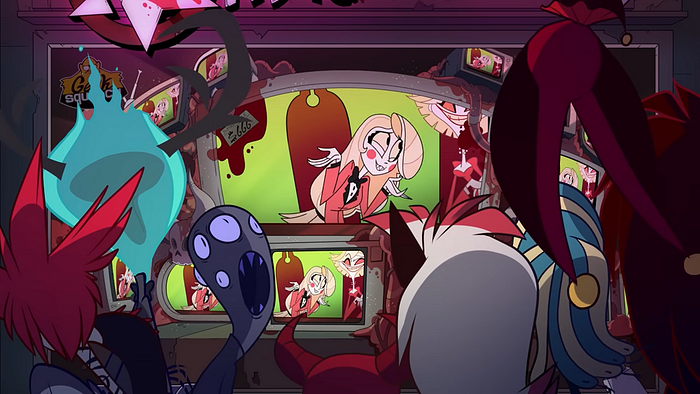
Believe it or not, for as much as I dislike the Amazon show, I can kind of see the appeal of the pilot. There’s something charming about it. It’s an artist’s sketchbook full of self-indulgent character designs come to life. The rough edges of the lively animation only add to this charm. The way some moments will be a little jankier, while others will put a little too much effort into lavishly animating the most inconsequential bits. It’s very visibly made by human beings who don’t entirely know what they’re doing, but they’re certainly giving it their all.
There are still some big problems with the writing, and I don’t love it, but I can see how it could have been refined into something solid. The genocide stuff and its ideas about what “redemption” means are, uh… well, we’ll get to that, but the contrast between our idealistic Disney Princess hero and the raunchy madness of Hell is an easy source of comedy. And the hotel angle, while kind of contrived, does make for a good setting. You can have all sorts of wacky one-off characters show up and stay in the hotel for an episode. I mean, look. Vivzie was only, what, 19 or 20 when she came up with a lot of these characters for her old webcomic, Zoophobia? She was far from a seasoned professional. But I can so easily envision a timeline where A24 got an experienced showrunner in as a supervisor to shepherd the project along, showing Vivzie the ropes and helping her bring out the potential of these ideas.
That isn’t the version of the show we got, though. Instead, all of the worst tendencies from the pilot were doubled down on while much of its potential went out the window. And it’s harder to give it the benefit of the doubt when it’s gone from being an indie passion project to being a major tentpole animation release for Amazon, with a star-studded red carpet premiere and billboards all over Times Square.

Yes there is in fact a lot of swearing in this
I’ll get this out of the way briefly because it’s one of the main things people make fun of, although it’s far from one of the biggest issues I have. But yes, the characters swear a lot. Like, constantly.
It’s not the presence or quantity of swears that I find grating here. I swear all the time. I swear all over this article. I watch HBO shows where people say “fuck” every other sentence and it doesn’t faze me. But in those shows, it feels more natural. Like, that’s just the way those people talk. In Hazbin Hotel, it feels like the writers are a little too proud of the swearing. They’re too eager. They emphasize it too much. It’s juvenile. Too much of the time it feels like a character swearing is supposed to be a punchline in and of itself. Occasionally this works, like one instance where Charlie loses her composure and screams “shut the fuck up” at someone heckling her, but most of the time it just reminds me of dorky Tumblr and Twitter users who have to say shit like “Okay listen up chucklefucks, everyone buckle the FUCK up for this motherfucking thread!” Like, please, dial it back a notch.
You do get used to the constant swearing, though. It just becomes white noise. What I’m more interested in talking about is the other big thing people tend to mock: the way the show looks.

The character designs
Watching the first episode of Hazbin was surreal for me. It feels like a show that shouldn’t exist. I don’t mean that there’s something wrong with it existing, that I don’t think it deserves to exist. But rather, the fact that it actually got made breaks some fundamental rule of how I thought the world worked. It feels like one of those things that would’ve been pitched via concept art on Tumblr back in the day, and people would’ve been like “OMG!! Everyone reblog this, we NEED to turn this into a real show!!!” And that would’ve been the end of it. Except they actually went and made the damn show. It evoked the feeling of, like, if the infamous Miss Officer and Mr. Truffles pitch had been picked up as a full TV series by Netflix, and I was sitting down and watching it.
A lot of this vibe comes down to the character designs, which strongly evoke visual traits that were popular on Tumblr and DeviantArt a decade ago that have always been like nails on a chalkboard to me. The big one is that almost every single male character seems to have been designed in a lab to be a “Tumblr Sexyman.” (The women, on the other hand, all look like Monster High dolls.) If you did a drinking game where you took a shot every time a new character was introduced who’s extremely thin with a top hat, bow tie, a big evil grin with sharp teeth, and Roaring Twenties overtones, you would die of alcohol poisoning halfway through the season. It’s Once-lers all the way down.
But, okay, that’s subjective. Maybe you want to jump the Once-ler’s bones. You’re allowed. Beyond the fact that they don’t jive with my personal tastes, I do think that the character designs genuinely hamper the show.

For one, many designs are overly detailed, which I can only imagine is a nightmare for the animators responsible for making them move frame by frame. And I generally do think those animators are doing good work with the hand they’ve been dealt. Everything is drawn very well. The characters are made of appealing shapes. Their faces are very expressive. They move in fun ways, squashing and stretching and snapping into dynamic poses. There’s clearly a solid grasp of the fundamentals here, and I can see why people like the animation. It’s just buried under so much nonsense.
Tons of characters have to be covered in random little spots and hearts and stripes. Things like this are common among younger artists within certain art communities online. With the furrier characters on the show, “sparkledogs” come to mind. And I get where the impulse to design characters like this comes from. You want your OCs to be unique, so you give them all sorts of identifying details, or come up with arbitrary little surface level quirks for your art style. When designing a ref sheet, maybe you fear blank space looking “boring” on a design. There’s perfectly good real estate on the back of that character’s head that could be used to add more little hearts and polka dots and whatnot! There’s no shame in any of this. We’ve all been there, and it can be just plain fun to draw. Sparkledogs are fun! They’re a totally harmless form of self-expression. But, again, when you’ve got an army of overworked animators who have to worry about making sure Husk has all the multicolored dots on his wings in every frame, it might be time to show some restraint.
As is often the case with younger artists who indulge in these sort of things, I feel like the excessive surface details are compensating for a lack of variety in other regards. Most notably, there’s a glaring lack of body diversity on the show, with almost every character being thin and lanky with a snatched waist. (In episode 5 I was so shocked when a short, fat woman burst into the scene and proved that this show was capable of depicting a character who isn’t skinny that it was practically a jumpscare.) Characters don’t tend to look their age, either — everyone just looks like they’re in their 20s. For another example, all but one of the main characters share similar red/white/black color schemes with minor yellow details, which tends to make group shots visually cluttered as hell. It can be hard to tell where one character ends and another begins when they’re close together, especially when the backgrounds are frequently dominated by the same colors. Take this group hug from the finale, for instance:

At some point, though, sooner or later, the character designs will make you ask a question: “Why do people even look like this in Hell?”
The inhabitants of Hell are broadly categorized into two groups. There are, of course, natural Hellborn demons, who are exempt from the exterminations. Charlie, for example. But most of the characters are “sinner demons” — the reborn souls of humans who died and went to Hell for their sins. There’s no way to differentiate the two at a glance, because every character design is just kind of whatever Vivzie wanted them to look like. As far as I can remember, there’s no explanation given for why people turn into furries and monster people and Once-lers and object heads and all sorts of other things when they die and go to the Christian Hell in this universe. Some of them gain overt themes, like Alastor being “The Radio Demon,” but others don’t. They also gain random magic powers, with some of them being insanely powerful! As far as I can remember, there’s never any explanation for any of this. An offhand line about how peoples’ souls “take on their true forms” in the afterlife would have gone so far.
And yes, I’m sure Vivzie’s explained this somewhere, either on social media or in Helluva Boss, but I shouldn’t need external explanations for the basic logic of a show’s world to make sense. Again, it feels like this show makes very little effort to ingratiate itself to people who aren’t already obsessive fans of the characters and world.
And, okay, maybe you don’t think it’s that important to be able to tell Hellborn demons and “sinner demons” apart. Fine. But then you look at the Exorcist angels, who also just look like Hot Topic demons!!

Now, I love fantasy and sci-fi series where it feels like anything goes, where character designs can just kinda be whatever the artists want because they can justify just about anything. In the realm of kids’ cartoons, OK K.O.: Let’s Be Heroes comes to mind, which depicts a world of heroes and villains where every single character was intentionally designed like they’re some kid’s OC based on their favorite Saturday morning cartoons, anime, and video games. That’s fun! But it works there because the broad cartoon logic of the world supports that ethos. In Hazbin, they don’t even really fit the theme of the Christian Heaven and Hell. If this was just a vague “underworld,” that would be one thing, but the very first scene in the Amazon show is about Adam and Lilith in the damn Garden of Eden! I never thought I’d find myself complaining about how a show didn’t have a good enough excuse to write in a giantess scene girl feathered dinosaur woman, but here we are.
The designs don’t even serve their individual characters because of their lack of variety and overabundance of details. A design is supposed to tell you a lot about the character at a glance, but the vast majority of characters here just recycle Vivzie’s favorite visual details over and over again — bow ties, top hats, sharp teeth, big evil smiles, mismatched eyes, pinstriped suits — to the point that it becomes impossible for any of these things to be seen as meaningful character choices. The main cast members all allegedly have animal themes that are supposed to have some sort of relevance to their personalities, but some of them are so diluted or so crammed full of other details that it’s impossible to tell what any of it means.
When Lucifer finally shows up halfway through the show, it lands with a complete thud. There’s nothing to make him stand out visually as the ruler of Hell and the literal fucking Christian Devil, because he just looks like every other Once-ler-ass side character on this goddamn show. He doesn’t even look or sound old enough to be Charlie’s dad!!!

But, okay. I’ve broadly talked about how the designs for long enough. Let’s properly introduce all of the main characters, each of whom will be a window into a different problem with the show.

Charlie
Like I said, Charlie is very much a Disney Princess. Played by Broadway star Erika Henningsen (perhaps known as the original lead in the Mean Girls musical), Charlie is an upbeat, idealistic young woman with absent parents who sings about wanting to follow her dreams. She even has an animal companion in the form of KeeKee, a cute little cyclops cat thing that turns into a giant hotel key, though confusingly I’m not sure it ever actually does anything in the story, and its presence is rarely even acknowledged in the dialogue.
I’d also compare Charlie to the archetypical modern kids’ cartoon protagonist. She’s an optimistic and compassionate hero who wants to see the best in everyone, to give people the chance to redeem themselves, and for everyone to get along, and she’ll happily break out into songs about these things. Think Steven Universe, Star Butterfly, or Kipo Oak. Hazbin Hotel very comfortably slots in with those sorts of shows in terms of its general storytelling aspirations, regardless of how adult its content may be.
Charlie has one of the most straightforward designs on the main cast, and I generally find her cute, though learning that she’s apparently supposed to evoke a satyr is a little bewildering. She has an animal nose and fangs, and from the side you can tell that she has a bit of a snout, but that’s it for visible nonhuman features. She supposedly has satyr legs with hooves, according to Vivzie, but this is just demonstrably not true.
Charlie’s fine. I don’t really have a problem with Charlie as a character, more the story around her. One nitpick I’ll point to right now is that the show — and, in particular, the musical numbers — do way less with the tonal dissonance between its protagonist and its world than you’d think.
Like, knowing the basics of the show, you’d expect the songs to be funny, right? You’d expect them to go for kind of an Avenue Q type thing, where they’re parodying kids’ media by doing upbeat music numbers about really adult subjects. Charlie seems tailor made to be a character who tries to sing her Disney musical songs, but then all the other characters and the world around her make it more adult, and maybe she either bristles against this or she’s just blissfully unaware of it. The trailer for the season implies this sort of tone to me — it’s built all around the mismatch between the upbeat Broadway songs and all the gore and perversion in Hell.

Charlie does, in fact, get a couple comedic musical numbers like this. There’s “Happy Day in Hell” towards the start of the first episode, a throwback to the opening number from Beauty and the Beast — except, you know, set in Hell instead of a small provincial town. So Charlie is running around singing about her dreams and how much she loves where she lives, but the dark world around her completely clashes with her optimism. (The song does, in fact, contain the phrase “demon bukkake shows.”) There’s also “Ready For This” in episode 7, where Charlie sings an inspirational song to try and get a bunch of cannibals to help her fight the angels, and the cannibals just keep interjecting to sing about, well, murder and wanting to eat the angels, and she just has to roll with it because at least they’re getting motivated by something.
But the vast majority of the rest of the songs are much more standard musical fare. Big emotional numbers, villain songs, clashes between two characters performed as duets. They aren’t really funny at all, nor are they particularly trying to be, although I guess the writers might think that the characters swearing in some of these songs is inherently funny. I’m not saying I love those two comedy songs — again, “demon bukkake shows” — but they at least feel like they’re doing something with the premise. With the rest, it’s easy to forget I’m not just watching a kids’ show. The whole point of Charlie being such an out of place character in Hell gets muddled when damn near every character is playing their Disney-style musical numbers completely straight.
Instead of leaning into this comedic dissonance, Charlie mostly just spends her time fretting about how the hotel plan isn’t really working out, due to the threat posed by the season’s overarching antagonist.

Adam
Yes, Adam! The first man! From the Bible! Played by Alex Brightman, star of the School of Rock and Beetlejuice musicals, Adam serves as the leader of the Exorcists and our main liaison with Heaven. Between the news that a demon had managed to kill an Exorcist for the first time ever in the latest extermination and Charlie’s proposal to start redeeming sinners, Adam decides to move up the date of the next extermination. This gives Charlie a hard six month deadline to try and prove her sinner redemption plan can work.
As the time limit implies, the first eight-episode season takes place over the span of six months. Characters will act like they’ve been through so much together and they’ve done a ton of off-screen bonding and really grown as people, but watching the show it’ll feel like it’s just been two weeks, because very little actually happens. Part of this is definitely a sign that the writers struggled with the short season and wished they’d gotten more episodes to work with, though I’m hesitant to claim that giving the team more episodes to space out those major developments would have solved many of the show’s storytelling problems. A lot of the ideas here are just not very good.
Take Adam, for example. For some reason, Adam’s whole thing is that he’s a horrible dudebro misogynist who’s constantly talking about sex.
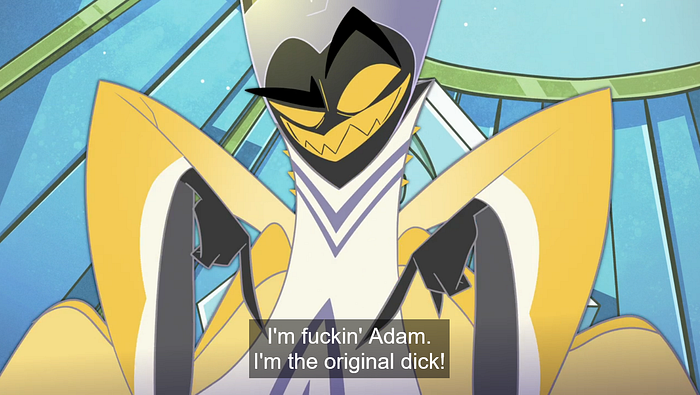
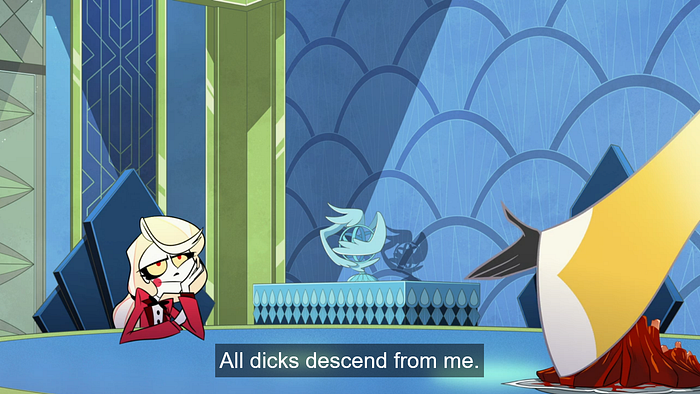
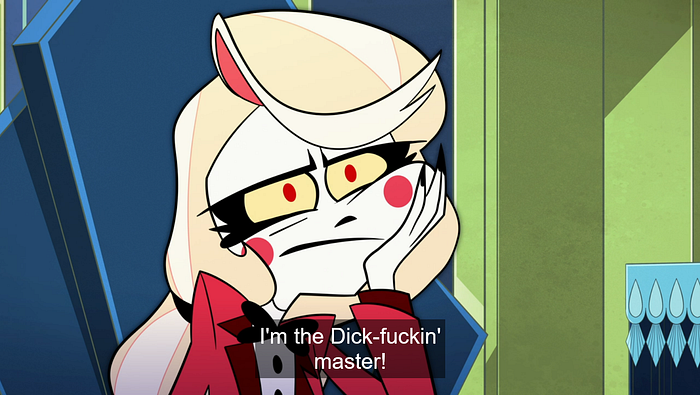

Charlie’s face really captures how the dialogue in this show makes me feel.
The whole time, I was just asking myself “Why is Adam, the main angel in a show about angels and sinners, like this?” The fandom’s favorite little excuse that the characters have to talk like this because they’re sinners in Hell falls apart when even our lead angel acts exactly the same. Between this and his design that’s honestly just a Helluva Boss imp with a robe and a halo, I wondered if there was going to be some twist about Adam actually being a sinner demon under his mask. (Yes, that’s a mask.) But no, in the finale we see that he looks like a regular human under there, which I suppose is fitting for the first man, and his status as an angel is never questioned.
This leaves us with a story about privilege and double standards, where the sinners in Hell are deemed worthy of death for their misdeeds, while Adam can do whatever he wants and get away with it because he’s already in Heaven. And I guess there’s kinda something there, but man, the way this show talks about (and doesn’t talk about) conservative Christian morals and puritanism and the idea of redemption is such a fucking mess. We’ll get to that.
In the meantime, let’s talk about Charlie’s girlfriend.

Vaggie
Yes. Charlie’s girlfriend, the only lesbian on the main cast, is named Vaggie.
One of the fun things about coming to this show blind is learning about years of inane fandom drama that I missed. Vaggie’s name was naturally the subject of many such arguments. Obviously, the name is very stupid, but the defense was always that it was supposedly short for “Vagatha.” Of course her name isn’t “Vagina!” It’s pronounced with a hard G! Get real!
And then the season comes out and episode 6 reveals that it is, in fact, short for Vagina. Adam named her after his favorite thing.
It’s supposed to be a shocking, emotional moment when this is revealed.
In practice, though, my main issue with Vaggie’s name isn’t even what it’s short for. It’s that Charlie’s voice actress doesn’t always pronounce her V’s the most clearly, so half the time it sounds like she’s calling her girlfriend “faggy.” Which had Anthony and me in stitches multiple times throughout the show.
Honestly, her stupid name is probably more fun to talk about than the actual character, who I feel is the most bland member of the main cast. In the pilot, Vaggie kind of came off as a stereotypical Angry Lesbian, a pessimistic and frequently offended little ball of rage to balance out Charlie’s boundless optimism. I have to wonder if Vivzie received some criticism about this, because Vaggie’s anger feels toned down in the final show, leaving her the empty shell of a character. She’s still the more pessimistic, snarky, bossy one as a foil to Charlie, but she doesn’t have much of a life of her own. For much of the season, she seems to only exist to support Charlie and her dreams. She’s Charlie’s bodyguard, I guess, but it’s not like there’s any serious fighting in this show prior to the finale.
It doesn’t help that she has what feels to me like the most underwhelming and monotone vocal performance of an otherwise strong cast, provided by Stephanie Beatriz of Encanto and Brooklyn Nine-Nine fame. In an early episode she briefly puts on a drill sergeant act, and it’s so forced and half-hearted that I questioned if we were genuinely supposed to believe that Vaggie has some sort of military background.
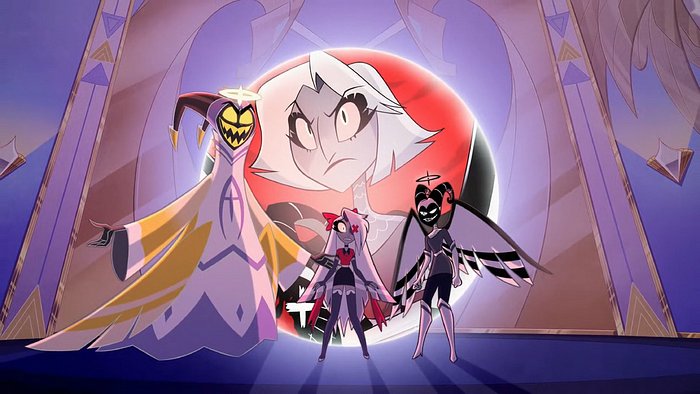
As we learn in episode 6, though, it turns out she does have a military background. In a shocking twist, it’s revealed that Vaggie was formerly an Exorcist, one of Heaven’s soldiers sent to exterminate sinners in Hell. This was visually foreshadowed by the fact that Vaggie has an X over one eye, similar to the emotive masks that the Exorcists wear. I didn’t particularly take this as foreshadowing because I couldn’t tell how much the X eye thing was a specific lore thing and how much it was just another one of Vivzie’s little pet design quirks from when she was a teenager, like how other characters will randomly have little hearts all over them without it necessarily meaning anything. It would’ve perhaps been more obvious that Vaggie’s moth wing motif is actually an angel wing motif if we had seen any of the angels who look anything like Vaggie prior to the episode with the reveal. Again, the character designs are so all over the place and so prone to including random details for the hell of it that it’s difficult for the show to use character design as a storytelling tool.
While the show briefly tries to use Vaggie hiding the secret of her past as a demon-killer as a source of drama, Charlie ends up learning the truth within the same episode, and then everything is easily resolved in the one after that. It’s a little confusing that whether or not Charlie will forgive Vaggie is even treated as a question, since Charlie’s whole life revolves around wanting to give second chances to murderous demons and send them to Heaven. It’s not like Vaggie betrays Charlie or anything — she’s already disavowed Heaven and completed her own redemption arc long before the show started.
In general, I’d point to Charlie and Vaggie’s relationship as one of the weakest character dynamics on the show. I don’t doubt that these two are very personal characters for Vivzie, but it’s weird to me that these two have such a chaste and understated romance in a series so full of extremely explicit sexual humor. They occasionally reference the fact that they’re dating in an offhand way, they sleep in the same bed, and the season finale has a brief romantic duet where they finally kiss — which happens to be tied for the title of the shortest song in the show, at only a minute in length. But other than that, basically nothing would change if Vaggie was just Charlie’s supportive best friend instead of her girlfriend. There’s very little intimacy between them, or any flirting, or really much chemistry at all. I’ve seen children’s cartoons with more intimate lesbian couples. They’re boring. Vaggie is boring.
Speaking of explicit sexual humor!
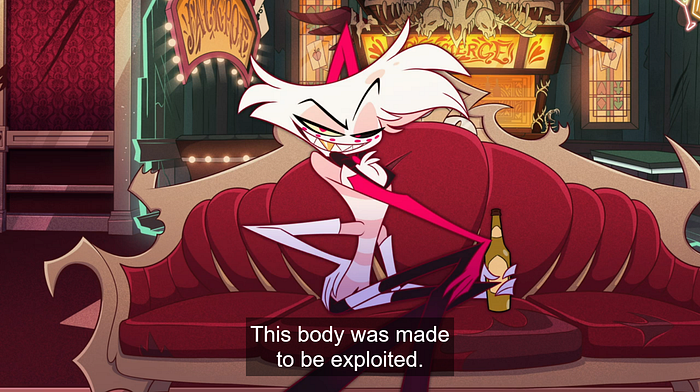
Angel Dust
Angel, the hotel’s main guest, is… a lot. Played by Blake Roman with a thick New York accent that honestly just makes me think of Rattrap from Beast Wars, Angel Dust is the most famous gay porn star and male escort in Hell, and he won’t let you forget it.
Almost every line that comes out of his mouth is about his sexual prowess, or about wanting to fuck every other male character he meets, or about his gag reflex, or about how he wants somebody to fill his holes, or about how something another character said could be interpreted in a sexual way, or about how his chest fluff looks kinda like a pair of tits and his partners love that, or about how he thinks the gang should resolve their current problem by letting him film a porno. He drags Charlie and co. into sexual situations that make them uncomfortable for laughs, whether it’s taking them to a BDSM club or making them watch some of his porn as a group. This shtick gets old immediately. It’s as if every scene has an invisible timer ticking away, and when it goes off that’s Angel’s cue to randomly interject with something like “Hey, did you guys know I love suckin’ dick?” And if he’s not talking about sex, chances are he’s talking about how much he loves drugs. His name is “Angel Dust,” after all.
So, with all that in mind, I was in shock when Angel Dust ended up being the character with the most potential on the show. If I had to pick a favorite, I guess it’d be him.
He’s still extremely grating and one-note at times, particularly in episodes focusing on other characters where he’s just there as the comic relief gay guy who interjects with sex jokes. But in the two episodes that shine the spotlight on him and his tragic, fucked up life, Angel is the only character that actually made me feel something. He’s capable of some surprising depth and nuance, and I found myself genuinely sympathizing with him. We’ll talk much more about all that later.
Also, Angel Dust’s real name is revealed to be Anthony. Which my boyfriend naturally hates.

Husk
The hotel’s bartender. He has one of my least favorite designs. I don’t know why the gruff, shit-talking old bartender who calls ’em like he sees ’em is, like… a skinny little owl catboy twink thing who’s covered in spots and hearts and stripes, with a bow tie and top hat? How do these things relate? Husk also has a history with gambling, and I can kind of see the theming there, but again, the design has so many individual details that any motif gets lost in the clutter. And I don’t know why he needs the wings, or why they always have to be visible instead of getting tucked away. Their high contrast clusters of multicolored spots add so much unnecessary visual clutter to any group shot he’s in. Look at this:
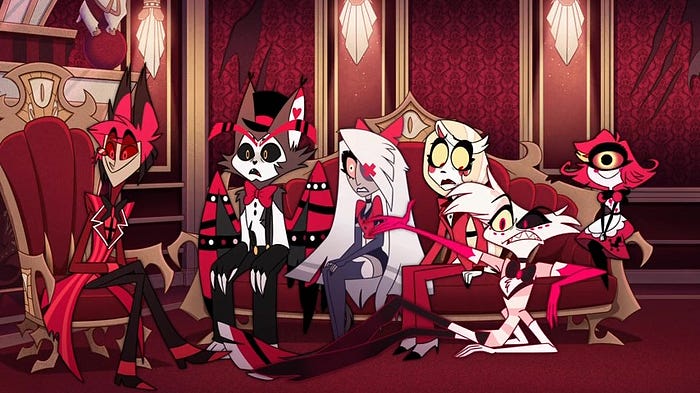
Actually, researching this a little further, I found out that this is already the simplified version of Husk’s design. All those little spots all over his wings were supposed to be different card suit symbols. It could have been even worse.
Husk mostly exists to be shipped with Angel Dust, with the two hating each other at first and getting along better over time. He also gets one of my favorite examples of Hazbin’s “tell, don’t show” writing in episode 4, where he just starts listing off everyone else’s character flaws to show how perceptive and blunt he is. The only thing giving this character any charm whatsoever and elevating him above being a Karkat Vantas wannabe is the fact that he’s played by Keith David. Yes, that Keith David. That deep voice with all that gravitas and charisma is coming out of this overdesigned twink catboy. It’s wild. The first time he opened his mouth I was like “That’s the character they got Keith David to play?!”
Oh, and there’s one more thing worth mentioning with Husk, regarding his relationship with another character. Let’s put a pin in that for a moment.

Niffty
The hotel’s manic maid played Kimiko Glenn, who you may know as Brook in Orange is the New Black, Horse in Centaurworld, Izzy Moonbow in My Little Pony: A New Generation, or Peni Parker in the Spider-Verse movies, among many other roles. Niffty exists to be the obligatory “gremlin” archetype character, because fandoms eat that kind of thing up. She’s small, cute, mischievous, and hyperactive, but ALSO she loves murder. There’s very little to her because she’s a pure comic relief character. Maybe I’d find her more charming in another show, one where fewer characters feel like they were created in a lab to hit on specific tropes that are like catnip to fandoms in the most mercenary way possible.
Niffty is at least responsible for one of the few jokes in the series that made me laugh. She excitedly volunteers to participate in a commercial for the hotel, but then every time they start filming she just completely blanks out like this:

For a while we weren’t sure whether or not Niffty is supposed to be a child. She’s the size of a child, and half the time she’s written like a child that’s had too much sugar, such as when the gang is hanging out at a bar and Niffty doesn’t seem to understand what people do in bars. But in one episode when Angel Dust brings the gang to a BDSM club she puts on a black latex dominatrix outfit, so uh… I guess she’s an adult.

Sir Pentious
Also played by Alex Brightman, Sir Pentious is the second guest who stays in the hotel. He’s not the worst, I guess. I tend to like the whole “pompous, scheming supervillain who comically fails at everything” thing, and he’s not a terrible version of that. He has his moments. He’s also the only member of the gang with a slightly different color scheme, so I’ll give him that.
It’s a little baffling that the show thinks I’ll care about his growth as a person when he’s such a joke of a character, though. They try really hard to push him as the “looks like he could kill you, but is actually a cinnamon roll” character with what little screentime he gets, revealing that he’s a total dork beneath his villainous exterior. It’s super forced, especially him suddenly falling in love with his female rival, Cherri Bomb. The scene where he asks if she would like to “do a sex” with him is perhaps one of the most painful scenes I have ever had to watch in my life.
Last but certainly not least…

Alastor, and his inescapable gravity
Alastor the Radio Demon is apparently the most popular character on the show. Seemingly by a pretty wide margin.
I hate him.
Every single aspect of this character is agonizing to me. I hate the way he looks, I hate the way he talks, I hate the way he acts, I hate the way the show is so completely in love with him, I hate his very existence. There is no character who drags down this show as much as Alastor. My rating of this show would jump up a point or two if you just deleted Alastor.
The first thing wrong with this guy is that he’s just got way too fucking much going on. Let’s list some of his character traits here:
- He’s the “Radio Demon.” This means he has a microphone-shaped* staff and talks like an over-the-top old-timey radio host at all times, complete with a radio filter effect over his voice. The voice is already grating enough for me to dislike him based on that alone. His eyes also sometimes transform into radio dials. Again, it’s not entirely clear why a small handful of the demons like Alastor embody different concepts like they’re Chainsaw Man devils when most of the others don’t, or why a human soul would even become the embodiment of a concept after death in the Christian Hell.
- * When the microphone part of the staff is facing away from the camera, as in the screenshot above, it just looks like a butt plug. Believe it or not, I don’t think this was intentional.
- Despite having nothing to do with the radio theme, he’s also a deer boy, because he was originally conceived as a deer demon in Zoophobia. You might not notice this at first. I thought his two-tone hair was supposed to be shaped like fox ears or something until I eventually noticed his teeny tiny little black antlers.
- He’s a sadistic cannibal with razor sharp teeth.
- In his life as a human, he was a serial killer.
- He is literally always smiling menacingly and is insufferably smug.
- He dresses like the Once-ler and wears a monocle. (At least he doesn’t have a top hat.)
- Despite being radio-themed, he can make video glitch effects appear around him and distort the screen.
- On some occasions he gains glowing green stitching over his mouth, like this:

- These stitches may or may not be a “voodoo thing.” The word of god excuse for this is that he’s supposedly half Creole. (On the other hand, his voice actor, Amir Talai, is of Iranian descent.)
- Sorry let’s just really let the Creole thing sink in for a second
- He makes shady “deal with the Devil” type soul contracts with characters as part of his vague schemes, seemingly wanting to play all sides at all times. Lucifer, the literal Devil, does not do this in this show, but Alastor does.
- Despite being a sinner who previously lived a normal life as a human, he somehow seems to be the most powerful entity in Hell by a wide margin, even rivaling Lucifer. Both the pilot and the full series recount how he just showed up one day and started wiping out Overlords of Hell and claiming their territory. Alastor immediately stomps just about any threat to the hotel — that is, until the finale, where he needs to randomly lose against Adam and slink away into the shadows for a bit so that the actual protagonist of the show and her dad can beat the villain.
- And, to top it all off, he can transform into a giant and even more edgy eldritch tentacle monster form where he’s even more powerful. Again, no idea what this has to do with the radio theme!
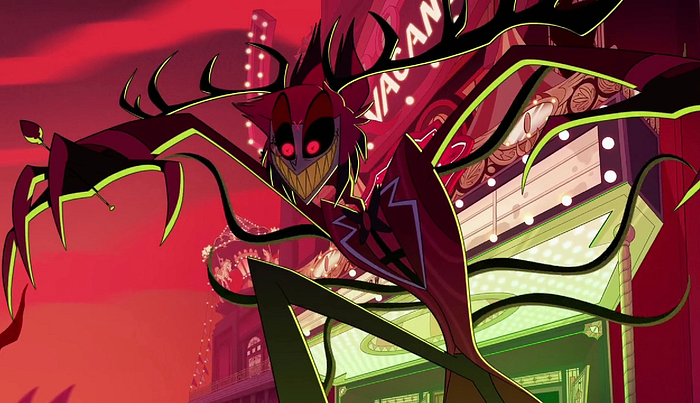
It’s just too much. I rankle at media criticism that calls characters “Mary Sues” or “Gary Stus,” so I won’t take that route here, but I just find Alastor plain annoying. He has quirk after quirk after quirk piled on top despite having an extremely one-note personality. He’s trying entirely too hard and he’s just fucking lame. I am allergic to everything this character represents. If you locked some animators in a room for a year with nothing for entertainment but a bunch of horny humanized Bill Cipher fanart from 2014 and some electro swing playlists, Alastor would be the character they’d make. Again, absolutely not for me.
The thing is, for as much as Alastor has going on, for the first few episodes we were often left asking a question: “Why is Alastor even here?” We’d initially skipped the pilot that sets Alastor up as the shady benefactor of the hotel (and, honestly, makes him look like the main antagonist of the show), and the Amazon show didn’t convey his role particularly clearly at first. So he was just, like. This annoying Tumblr Sexyman who hangs around the hotel and has a grating, gimmicky voice and is like “heehee I’m so evil.”
Despite seemingly contributing so little, though, Alastor is constantly derailing the main story so that we can follow him around and meet characters he knows. Of the eight 22-minute episodes comprising this season of television, four feature lengthy tangents about new characters spurred on by Alastor. This is what elevates him above being simply an amalgamation of a bunch of tropes I find annoying and turns him into a true menace to this show’s writing. When I say that the scripts feel like a first draft, that they don’t properly know how to spend their time, and that they place emotional beats in the wrong order, so much of that comes down to these Alastor-related subplots.

Episode two is the one where Sir Pentious becomes the second guest at the hotel and Charlie starts to work on redeeming him. However, much of its runtime focuses instead on introducing Alastor’s rivalry with Vox, a demon with a TV for a head (who of course needs a pinstripe suit, bow tie, top hat, sharp teeth, and mismatched eyes etc. etc.) who runs a TV empire in Hell that rivals Alastor’s radio empire. This, in turn, means we have to spend a bunch of time with Vox, and meet characters he interacts with, as if I give even a single shit about this old vs. new, radio vs. TV thing they have going on, or Vox as a villain. (It seems like he’s being set up as the villain for season 2. Yaaaaayyy.) We literally just established in the first episode that the clock’s ticking for the next round of genocide, and that we need Charlie’s hotel plan to work if there’s gonna be any hope of stopping it, but it feels like the show is already losing interest in that.
The A- and B-plots here are at least somewhat connected, with Vox getting Sir Pentious to spy on the hotel for him, but I don’t think that means we needed a whole three-minute musical number about Alastor and Vox’s rivalry, especially considering Vox doesn’t do anything for the rest of the season. The balance is completely off. But even though the stuff with Sir Pentious himself feels like such a footnote, with even Angel Dust getting more depth in the episode, it still ends with the song “It Starts With Sorry,” in which Charlie convinces Pentious to tearfully apologize for his misdeeds and take the first step towards true redemption. In the moment it’s so fucking funny that Pentious apologizing is treated as such a big emotional crescendo worthy of a song when the episode wanted to focus on anyone other than him.

(There’s that giantess scene girl feathered dinosaur woman I was talking about. I wish she was in a better show.)
Episode three also has us getting sidetracked to learn about Alastor’s life and even more new characters outside of the hotel, following him to a meeting with the other Overlords of Hell. There, the question of who exactly killed an Exorcist is raised. Now, you might think this would linger as a central mystery of the season. Maybe we’d have different suspects and wonder who did it. At least one or two of Charlie’s friends should be implicated, right? That’s a good hook for ongoing drama! Maybe Alastor did it as some kind of 4D chess move. If we’re gonna focus so much on Alastor, can we at least, like, have him do something?
You might think these things. But you’d be wrong.
As Alastor learns, the one who killed the Exorcist is Carmilla Carmine, one of the Overlords. We only meet her in episode 3, and she admits she did it in her second scene. Why’d she do it? Why, to protect her family! And we only learn she has a family in the scene where she confesses, because… well, her two daughters are standing there in the scene. The daughters get a total of four lines across the whole episode. Even still, Carmine launches into a big emotional ballad about the hard choices she’s had to make to protect her family and about how her actions have now put her family in danger, as if these aren’t all characters we just met. (Carmilla gets the spotlight in both of the songs in episode 3 because they need to develop her as a character ASAP, and also because she’s played by one of the original stars of Rent.) This song also tries to depict some kind of parallel between Carmilla and Vaggie, who’s barely had any character development by this point, so it just falls flat. They don’t even show a flashback to the damn murder until episode 7, the only other episode Carmilla is in! This could have been such a good source of drama for the main cast, but instead it’s handed off to some other random character in Alastor’s orbit.

Perhaps the worst of all these episodes that get derailed by Alastor-related subplots is episode 5, “Dad Beat Dad.” At this point, even though it feels like no time has passed and no progress has been made, it’s apparently already been four months, with only two months remaining until the next extermination. Charlie generally hates using her position of power as the Princess of Hell to support the hotel, even though you’d think she’d pull out all the stops to try and end the genocide, but here she finally caves and decides to get help from her dad.
Despite being set up as a mysteriously absent figure by the first episode’s opening lore, Lucifer has just been… depressed over the fact that he signed off on the exterminations, and hiding in his house to ignore his problems. The show doesn’t seem particularly interested in addressing the fact that Lucifer is partially responsible for the ongoing genocide. Instead it’s like, look, he has a rubber duck obsession! Lol so random!!!!
Anyway, so Lucifer comes to the hotel, and he has to go around meeting all the other characters. And then he meets Alastor. And suddenly, the show decides that they’re rivals.
Because, apparently, we were supposed to see Alastor as a father figure to Charlie this entire time.
This is maybe the most insane story beat in the entire show to me. When I say the writing has a “tell, don’t show” problem, this right here is exhibit A. I got zero indication that Alastor is supposed to be like a father to Charlie. I didn’t even realize he was supposed to be that much older than her! Shit, they’ve barely even had any meaningful interactions! The only episode in this season that’s really about Alastor helping Charlie out is two episodes after this one, when he takes her to Cannibal Town to rally the troops there. But suddenly the show makes this nonexistent dynamic a big thing and does a whole musical number, “Hell’s Greatest Dad,” where Alastor and Lucifer argue over who’s the better dad for Charlie.
(Apparently in some interview Vivzie explained that Alastor is bullshitting here and lying about his relationship with Charlie just to get under Lucifer’s skin, in which case, great! Instead of focusing on a character dynamic that didn’t feel properly established, that would just make this subplot a complete fucking waste of time. Great. These plot cul-de-sacs are one of many things I’d like to think a more experienced producer might have advised against.)
And THEN this fuckin’ shortstack flapper woman bursts into the hotel and interrupts Alastor and Lucifer’s song???
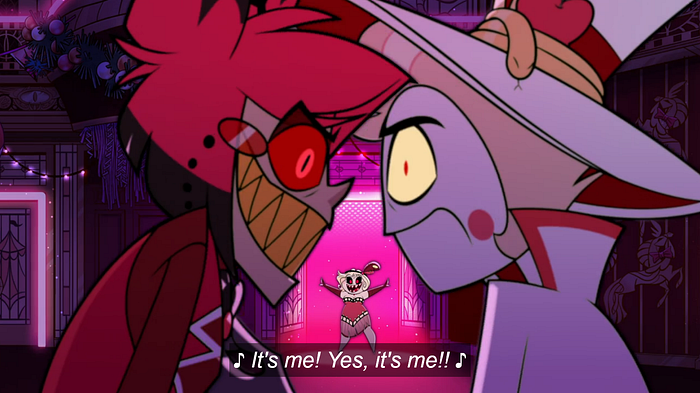
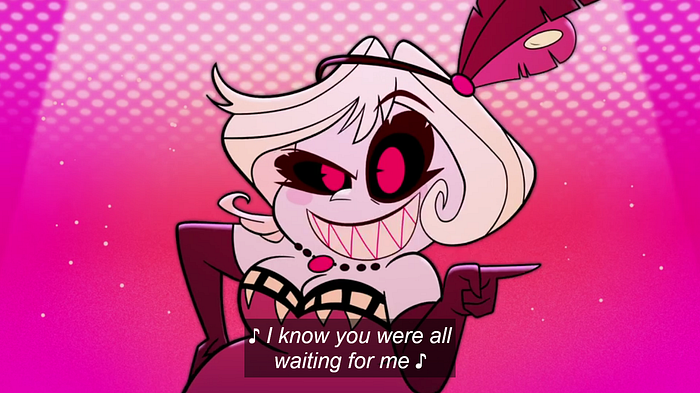
Yeah, so here’s that sudden “Vivzie can design a fat character?!” jumpscare. We were stupefied at this point.
This character is Mimzy, who Hazbin fans have been arguing over because they can’t decide whether or not she’s a Jewish stereotype and — look, I’m getting off track. What matters is that Mimzy is another character who knows Alastor, and she’s here to derail this episode that’s supposed to be about Charlie and her relationship with her dad so that it can instead be about Mimzy explaining how Alastor is the most twisted fucking cycle path in the history of Hell. And once again, the climax of the episode is an emotional musical number that feels completely unearned — this time, a duet between Charlie and Lucifer capping off an episode where they barely interacted because of all the focus on Alastor.
…Oh, and there’s one more thing this episode draws attention to regarding Alastor.
So, you remember when I said Husk had a relationship with another character? What I meant is that he has a history with Alastor. Back when he was a gambler (and an Overlord, apparently), Husk made a bet with Alastor and lost, meaning that Alastor now owns Husk’s soul.
Yes. Alastor, the writers’ pet Tumblr Sexyman character, owns Husk, the only Black-coded character on the main cast, as a slave.


Did you know that the slave owner who chains up the only Black-coded character on the main cast and threatens to torture and kill him is also supposed to be the token aromantic asexual representation on the main cast? And also don’t forget that he’s apparently half Creole, so it’s totally not problematic!!! Anyway I hate this fucking show so goddamn much
It’s wild to see the mental gymnastics Hazbin fans pull to try and woobify Alastor in spite of this. I’ve seen people say shit like “Well, Alastor only threatens Husk when he talks back, so he’s really not that bad!” or “Well, at least Alastor doesn’t hit Husk!” I also see the “Alastor is a villain, of course he does bad things” card used a lot. And like, in many other instances, I agree with that logic. But I’m not so sure the writers of this show agree that Alastor is the bad guy! The show is completely enamored with him, and it flip flops between treating him like a genuine menace, acting like he’s becoming friends with the rest of the gang, and hinting that poor widdle Alastor is actually just being used by someone else. (Probably Lilith, Charlie’s absent mother, whose involvement is teased at the end of the finale.) They could take him in any direction they wanted.
Really, though, where the show lands on Alastor’s morality is a moot point. Either way, it won’t fix the complete tonal whiplash of the show being like “oh yeah btw Alastor owns Husk as a slave and threatens to tear him apart if he acts up” and then expecting you to still care about whether or not he’ll help Charlie teach Sir Pentious how to say thank you or what the fuck ever. That is the problem.
Again, I think the show would be moderately improved just by removing Alastor from the story, or at least drastically reducing his screentime. They could’ve used the time spent on him and his related subplots to expand on things like, oh, I don’t know…

The titular Hazbin Hotel
Remember when I was talking about the potential of the pilot? Had I watched the pilot in 2019, I would have expected the hotel to be the show’s story engine. Various characters show up as guests to the hotel, and that drives the stories. It’s so obvious! It writes itself.
You wanna know how many new guests stay at the hotel over the course of the season?
One.
It’s Sir Pentious. Sir Pentious and Angel Dust are the only guests at the hotel. Both characters introduced in the pilot. Nobody else stays at the hotel. Despite damn near every new episode introducing new characters, none of them stay at the hotel.
After a while, I started asking another one of my little questions: “Why is this show even set in a hotel?” It’s so thoroughly uninterested in doing things with the hotel as a setting. We barely even see rooms other than the lobby. They don’t get guests. They barely have any staff, and without guests they rarely have to do their jobs. But even still, we have to get endless scenes about the idea of the hotel, with Charlie bemoaning that the hotel isn’t as successful as she’d hoped and that they really need to figure out something to make it more of a success before time runs out.
Now, as with many other problems with the show’s pacing and structure, it’s easy to see the short episode order as the problem here. And, sure. Maybe if we’d gotten 13 or more episodes this season, they could’ve done some one-off episodes about new hotel guests. But you know what? I kinda doubt it. Because everyone I know who’s seen Helluva Boss says that show also largely gives up on its premise after a few episodes, shifting much of its focus away from its demon hitman agency in favor of the cast’s personal lives. So I kinda think this is just a thing with Spindlehorse shows in general.
(Also, I have a hard time believing they could’ve pulled off a longer season at all, given it took them like three or four years just to make eight episodes. A 26-episode season would’ve taken them a decade, or otherwise would’ve required them to stop making Helluva Boss alongside Hazbin, and I know that would’ve pissed people off.)
Really, it feels like the hotel was only chosen as a setting because Vivzie likes using an ornate early 20th century hotel with its fancy wallpaper as a backdrop as part of her fixation on Roaring Twenties aesthetics. And I guess she also thought of a catchy title with the word “hotel” in it. It’s not even really a hotel at all. Charlie’s trying to use it as a rehab center. It’s a halfway house.
And at long last, that finally leads us back to the central theme of the show.

“Sin” and “redemption”
To me, Hazbin Hotel’s greatest failing isn’t any single character or episode. It’s the entire premise at its very core. The story about Charlie wanting to redeem sinners.
Let’s set aside the afterlife stuff for a second and look at it from a different perspective. Heaven and Hell basically function as two nations, with one having control over the other — almost as a colonial power, though that analogy doesn’t 100% fit. Regardless, Heaven fears Hell growing too powerful via “overpopulation,” and so a scheme has been arranged to prevent all-out war: Heaven gets to do just a little genocide to their rival nation every year, killing a few hundred random civilians just to keep them in their place. In the face of this genocide, our protagonist’s brilliant plan is to, uh… have some of the people of her nation prove that they’re worthy of not being murdered by cleaning up and learning good Christian morals. (Mostly just by having them do trust falls, and singing My Little Pony-ass songs about how you should say sorry, and that sort of thing.) And then she’ll ship her best and brightest out to live in the nation responsible for the genocide, as if they’ll just be accepted with open arms.
By the end of the first season, it’s not entirely clear whether or not the show understands the problems with Charlie’s plan, or its rather conservative undertones.
To me, the big problem with the pilot was that, when you really get down to it, the emotional core of Hazbin Hotel is about a rich girl from the upper echelons of society — a princess, even! — picking a crack-snorting gay sex worker up off the street and trying to turn him into a “proper” member of society. The villains of the series, the angels, hold the conservative Christian stance that Angel Dust died a sinner, and that he deserves to spend eternity in Hell because of that. Instead of arguing that maybe it’s fucked up to say someone deserves eternal torment for doing sex work and recreationally using drugs, Charlie’s best defense is “But I can fix him.”
Despite being a raunchy adult comedy on the surface, Hazbin has some kinda backwards ideas about sex. Sex is used in very specific ways on this show. It can be used for provocative shock value humor, as set dressing to illustrate the senseless debauchery of Hell. It can be something for the chauvinistic Adam to brag about, making the women around him uncomfortable. And it can be a form of abuse or exploitation, as it is to Angel Dust. But there are never any positive sexual relationships. Sex is never a good thing. It’s a sin. I think this is where the extremely chaste relationship between Charlie and Vaggie really starts to rub me the wrong way. Charlie is the show’s moral compass, and she’s depicted as “pure” and “innocent” and completely sexless. Charlie and Vaggie barely even hug or cuddle. I think they kiss once, in the finale. And like, obviously I’m not saying every romantic relationship needs to be sexual — ace people exist. But when you’re telling a story about a slutty gay guy who’s ruining his life by having too much sex, and how he’s being “saved” by a wholesome woman who never has impure thoughts, that… kinda sucks?
It didn’t always have to be this way. Let’s finally circle back around to why I said Angel Dust was the character with the most potential. (This is also where we get into some very heavy subject matter, as signaled by the content warning at the start of this piece.)

Episode 4 is when we really learn about Angel Dust’s life in the porn industry, and his abusive relationship with his manager, Valentino, one of the other Overlords of Hell. Because of their contract, Val owns Angel’s soul and thinks he can do whatever he wants to his “favorite toy.” He’s physically abusive towards him, giving Angel a black eye when Angel “acts out,” and it’s implied there’s a history of sexual abuse as well. Honestly, it’s pretty hard to watch, and there’s a huge difference in tone between this and the rest of the show around it. (The preceding scene before Val hits Angel had Charlie barging in on the porn set and getting into slapstick shenanigans, ending with her starting a fire on the set. Other episodes also can’t help but give Angel dark jokes about his abuse, such as an offhand line about how Val’s been waterboarding him lately. “I don’t know, it’s a kink,” he shrugs.) But setting the rest of the show aside, this episode is the first and only time it really made me feel for one of the characters. They were almost on to something here.
The main reason for that is the nuance of Angel’s feelings about this abusive relationship. I’ve complained before that many depictions of abuse in fiction are way too simplified — just a big, angry guy who hits his partner, and a victim who should know better than to stay. But this depicts an actual cycle of psychological abuse. Valentino breaks Angel down emotionally. He makes Angel think it’s his own fault that he’s in this situation. Angel, in turn, self-harms through his drug addiction and letting people do whatever they want with his body. “If I can ruin myself enough in the process… if I end up broken, I won’t be his favorite toy anymore.” This reinforces Angel’s negative self-image, which makes him feel like he doesn’t deserve better than Val, the only person who really makes him feel anything. And so the loop continues. Angel hides his true feelings and pushes others away by leaning into the hypersexual porn star persona who doesn’t give a shit about anything. It’s all a vicious cycle that Val keeps Angel in to exploit him.
Much of this is detailed in the episode’s first big musical number and one of the lead singles off the soundtrack, “Poison.” I won’t say this song handles these heavy topics delicately— the controversial visuals depicting Angel at work are extremely sexually charged, and people absolutely have every right to find it uncomfortable— but the lyrics about Angel’s hopelessness make it the only song in the entire show that I find even remotely emotionally affecting. There is, at the very least, the seed of a compelling story here.
Unfortunately, I already knew the show wouldn’t be able to stick the landing.
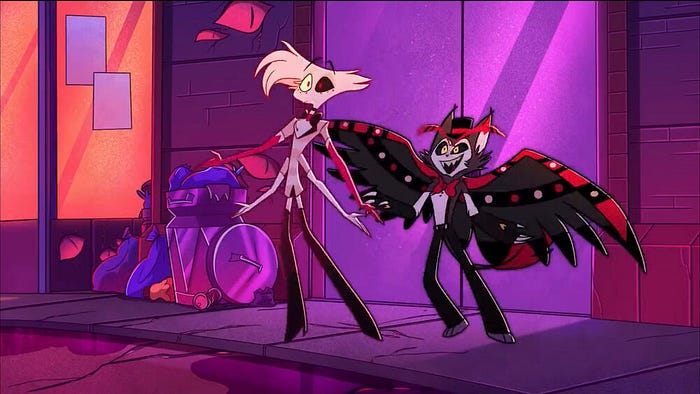
Things start to falter with the resolution of this episode. The whole time, Husk’s been noticing how bad Angel’s been doing beneath his carefree persona. Charlie’s corny positivity hasn’t been helping Angel at all. She just doesn’t get it. But the world-weary Husk thinks getting real with Angel might be what he needs.
And so we get the episode’s second song: “Loser, Baby.”
Husk: So things look bad, and your back’s against the wall
Your whole existence seems fuckin’ hopeless
You’re feelin’ filthy as a dive bar bathroom stall
Can’t face the world sober and dopeless
You’ve lost your way, you think your life is wrecked
Well, let me just say you’re correctAngel Dust: Wait, what?
Husk: You’re a loser, baby
A loser, goddamn baby
You’re a fucked up little whiny bitchAngel Dust: Hey!
Husk: You’re a loser, just like me
Look. I get what they’re going for. Husk gives him some tough love as a shock to the system, and then explains how his life sucks, too, so he can sympathize. But like… man, Angel Dust is practically a fucking sex slave who’s trying to slowly kill himself. Horrendous porn industry abuse is maybe a little much for this “life sucks, but what can you do?” mentality. (The Amazon show also hadn’t properly conveyed that Alastor owns Husk at this point, so when he’s recounting a story about how he used to be a gambler who lost his title of Overlord in a bet with Alastor it feels like a complete mismatch with what Angel is going through.)
I don’t know. The real glimmer of hope in this ending, to me, is right before the song, when Angel says “I didn’t ask for Charlie to save me.” Maybe, just maybe, this could be a sign that Charlie’s redemption plan is flawed, that she doesn’t really get people, and that in the end it’ll be more about self-improvement for the sake of self-improvement, rather than self-improvement so that you can stop being “a sinner” and get into Heaven. Angel seems to accept himself a little better at the end of “Loser, Baby,” after all.
And then, we get episode 6. The Heaven episode, where Charlie has to try and prove to the angels that redemption is possible. And of course, the one being judged is Angel Dust.

Perhaps the most shocking part of this episode, way more shocking than the big twist about Vaggie being an angel, is the realization that the angels don’t actually have a list of criteria for who does and doesn’t get into heaven. Yes, this show riffing on the Christian afterlife and sins and redemption does not actually have a list of what it considers a sin. They don’t even use the Ten Commandments. For that matter, God isn’t a factor at all, even though you think he’d be the guy deciding all this stuff. Adam ends up making a short list of criteria to judge Angel Dust by on the spot: “Act selfless, don’t steal, stick it to the man.”
Everyone in the courtroom in Heaven spies on Angel Dust as he hangs out at a bar with the rest of the gang, with invisible little moral tests along the way to see if he’s changed. Charlie at least argues that whether or not Angel decides to drink shouldn’t be treated as a sign of his moral character. What really bothers me is when Angel stands up for himself against Valentino at the bar, saying he can do what he wants outside of the studio, which Charlie treats as the example of Angel “sticking it to the man” that Adam wanted. And I just… yes, this moment is a win for Angel Dust against his abuser, but it’s gross to me to treat it as a moral win, y’know? To act like standing up against his abuser is what makes Angel Dust a good person deserving of a spot in Heaven? Come on.
This episode is also the only time the show actually does anything with the angels as homophobic puritans. This bit in the song “You Didn’t Know” is worded in such a vulgar way and is such a sudden shift in tone that it’s mostly just shocking in the moment:
Lute: What are we even talkin’ about?
Some crack-whore who fucked up already?
He blew his shot, like the cocks in his mouth
This discussion is senseless and petty
Again, we’re supposed to want Angel Dust to clean up his act so he can go up and live with people like this in heaven? Really??
But, okay. This is the point where Charlie realizes she’s never going to sway Adam, Heaven is built on double standards, and they’re just gonna have to fight back against the Exorcists the next time they show up. Which is what the last two episodes are about. Surely now, after all this, the show realizes the flaws in Charlie’s redemption plan, right? Surely they’re going for a “fuck it, we don’t need Heaven’s approval” message now that they’re literally battling Heaven, right?
I have no fucking idea!
In the end, the hotel is destroyed, but they just rebuild it and open it right back up to get right back to the redemption thing. And Sir Pentious dies a comically anticlimactic death in the final battle, but because he made a heroic sacrifice and has apparently grown so much over the course of this season, he’s rewarded… by becoming an angel. He just respawns in heaven with a new design, a thing that was never presented as a possibility. So I guess redemption and becoming an angel is still supposed to be desirable? After all that???

Ah, but of course we also learned that, other than the lead seraphim, Sera, and the Exorcists themselves… nobody in Heaven even knows about the genocide! It was a secret the whole time! And right now, that feels like a move designed to make sure as few characters in Heaven as possible are culpable for the genocide, so that “reforming sinners” and sending them to Heaven can still be seen as a desirable and noble goal.
No matter how subversive Hazbin Hotel thinks it is with its foul-mouthed queer demon protagonists pitted against an army of angels, the series has been unable to actually say anything critical of conservative Christian values and the idea of sin. At best, season one gives us a message about double standards and forgiving people for past sins, saying that if people can change their ways later in life then they should be able to get into Heaven after all, regardless of their past mistakes. Which, uh. Is already a thing most Christians believe? Like, hello?? Charlie wanting to “save” sinners and get them into Heaven is almost indistinguishable from the behavior of many real life Christians, who want to convert “sinful” nonbelievers so they can atone for their actions and Jesus can “save their souls.” Which makes it kind of hilarious when fundamentalists hear about the show and go “Oh my God, this Amazon show is promoting devil worship!” Half the time Charlie just feels like a fucking youth pastor.
Look, I could keep going in circles about this stuff forever. It is a complete and total mess. Maybe they’ll go somewhere more thematically satisfying with the next season. Forgive me if I’m doubtful.
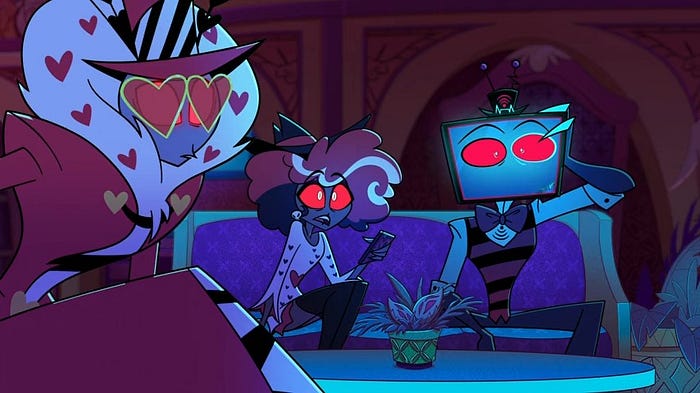
Stray observations
- I could’ve done a whole long section about how poorly paced the musical numbers are. Almost every single one starts at a weird time, either coming in at the end of a very long dialogue scene where we already get the point of what’s going on or serving as the climax of an emotional arc that had been barely touched upon. “Happy Day in Hell” is a throwback to classic Disney opening songs introducing the hero, her dreams, and the setting, but it only starts after almost nine minutes of exposition and dialogue scenes.
- Vox, Valentino, and another character whose name starts with V are watching the events of the final battle on TV the whole time and just constantly reacting to events how the writers expect the audience to react, and it’s the most annoying thing.
- Episode 7 is all about getting help from the cannibals in Cannibal Town and then they’re barely even a factor in the finale. They’re usually just shown as a featureless crowd of silhouettes in the background.
- There’s exactly one angel who takes Charlie’s side in episode 6 but then she just doesn’t help at all in the finale.
- Both Vaggie and Charlie try to do some kind of “be the bigger person” moment where they spare the lead Exorcists, even though everyone was just going around decapitating the nameless ones without a second thought just a minute before. Then Niffty just stabs Adam to death.
- I called Sir Pentious dying in the finale from a mile away because he was so obviously the most disposable one lmao. I am a little annoyed they removed the only character with a somewhat different color scheme from the hotel, though.
- Did you know this show currently sits at an 86% positive rating on Rotten Tomatoes?
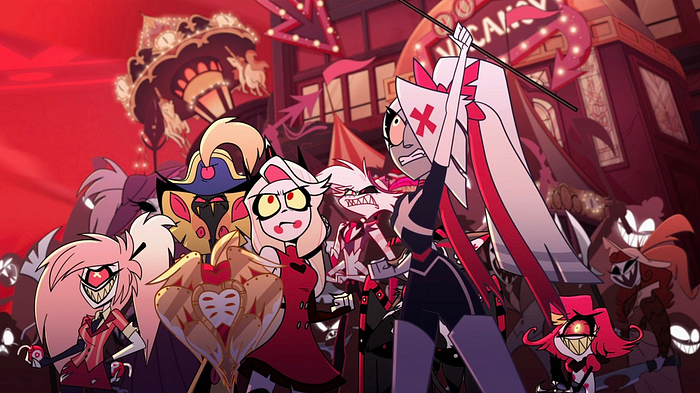
Closing thoughts
So, uh. I didn’t like this show very much.
Hazbin Hotel is a weird, weird show. Again, it had a ton of effort put into it. I don’t want to shit on the voice cast or the animators, who did good work with the material they were given. I don’t wish any harm towards the people who made it, or fans of the show. No, not even Vivzie. But I thought the show was a mess.
I was often left thinking about how cynical it all feels. It’s like a show designed to hit a bare minimum number of bullet points required to create a rabid fandom.
Instead of giving us time to get to know the characters and their relationships, we’re just flat out told how we’re supposed to see them. We get the Wikipedia synopsis of every character arc, and then at the end they act like they’ve all grown and changed so much. It reminds me of those TikTokers who write romance novels and try to sell them to you by just listing all the tropes they contain. Hazbin Hotel informs you of the presence of some tropes that fandoms love — the found family, the dapper demonic villain, the enemies to lovers ships, the gremlin, the heckin’ cinnamon roll redeemed villain, the animal mascot companion — and tells you to fill in the rest yourself. It’s written for an audience who have, in fact, already been filling in the rest for years, based on a pilot episode and years of social media posts from the creator. It’s designed to give people who already love the cast little moments to go “wow, I’m shook” or “OMG they confirmed that theory!” But if you aren’t already in love with these characters, the show they made probably won’t sway you.
Many will pin this rushed storytelling on how short the season was, and believe me, I am definitely a critic of how short TV seasons have become in the streaming era. It’s extremely limiting, particularly for shows built for a more episodic structure as opposed to the “it’s like one big movie” approach. The eight-episode season didn’t help, but I also don’t think squeezing in more episodes would have fixed this show. Many of its biggest issues seem like unforced errors to me.
But I’m also left wondering if this is just the natural end result of the current crowdfunded indie animation model. Yeah, that’s right, I found a way to blame capitalism!!!
Hazbin Hotel and Helluva Boss are the poster children for a model that requires small teams of up-and-coming animators, usually in their 20s, to put out a polished pilot that blows up as a viral hit and generates a huge, dedicated fandom immediately. Funding (which you need a lot of for TV-quality animation) is secured not just through Patreon or Kickstarter donations, but through mountains and mountains of merch that has to start coming out alongside the pilot. And then maybe, if you’re lucky, you get picked up by a distributor, after you’ve already become a massive success on your own. Of course that model is going to reward shows that hit on easy, marketable, fandom-friendly tropes. But it also means you can’t drastically change things from the pilot, because you might alienate the fandom that’s already there. The concept can’t grow and mature over time. You’re locked in from the start. Who knows if she’d ever even consider this, but imagine how Vivzie’s rabid fandom would have responded if she’d totally reworked the plot from the pilot to remove the genocide stuff. Imagine if the characters had been changed more drastically between the pilot and the full show, after all those shirts and pins and prints had already been sold. Imagine if she’d made the pilot non-canon after years of fanfics building off of it. If you piss off enough fans, there goes your funding.
I’m not saying the fandom made the Spindlehorse crew make any of the decisions they did, nor do I think that having to pitch to executives is a better system than this. I don’t want the David Zaslavs of the world to be the sole arbiters of what shows get made. But I don’t think this “democratized” crowdfunding model is as freeing as some make it out to be. It’s just a different ball and chain.
I don’t really have a solution to this. I’m not even an animator. I’m a game dev, and lord knows how bad our industry is doing right now. I just hope that, someday, there are more avenues for success than the ones animators currently have. VivziePop got to make her weird little self-indulgent show about demons — two of them, even! — and I may not like it, but I’d love for more industry outsiders to get their shot like she did. And maybe those other people could make shows with better dialogue.
